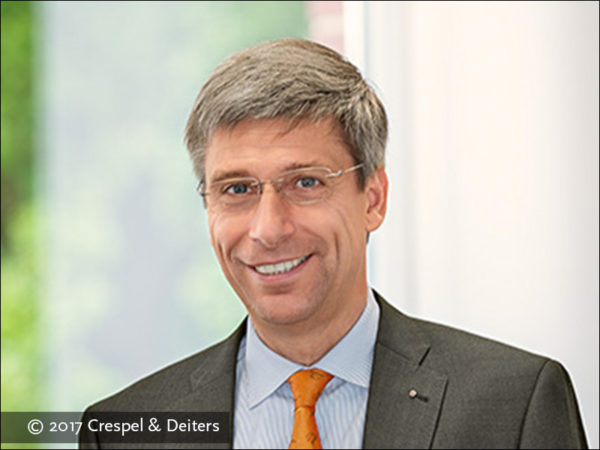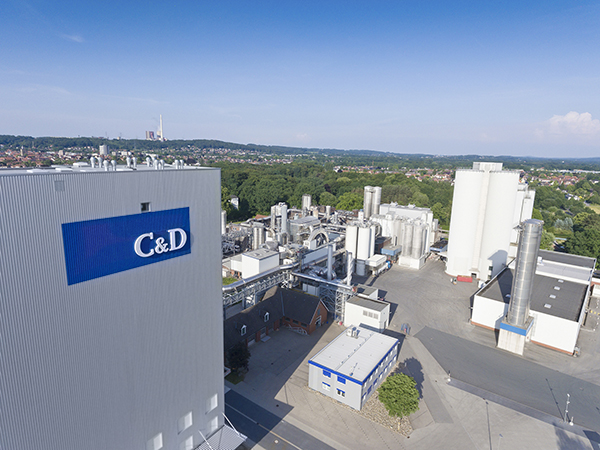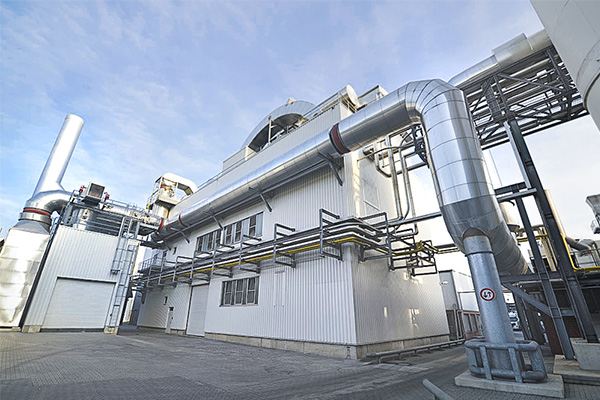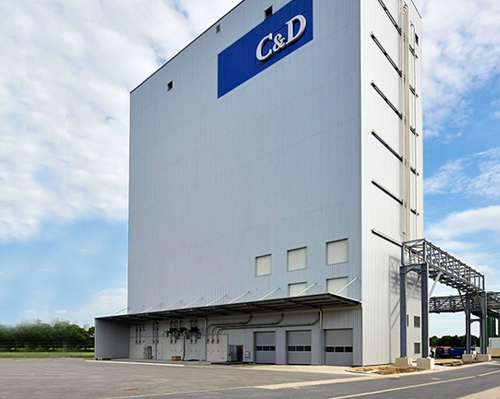Always looking forward: Energy management at C&D
With its sustainable measures, C&D becomes an official pacemaker of KlimaExpo.NRW
At C&D, wheat is at the centre of all innovations, developments, solutions, and products. As one of the leading European specialists for the separation of wheat into its constituent parts and their refinement into tailor-made products for numerous sectors of the food and non-food industry, C&D relies on a natural, renewable and sustainable raw material. C&D attaches great importance to continuing this sustainability in the company’s various areas and processes. For decades, environmentally-friendly and sustainable action has been one of our key corporate objectives. For C&D, as part of the Crespel & Deiters Group, this means facing up to responsibility, reconciling ecological requirements with the company’s economic interests and social tasks, and acting in a goal-oriented manner for all parties. Every day, C&D works on identifying and implementing savings potentials that it consistently uses to ensure sustainable management and protection of the environment for future generations. For its systematic energy management, C&D has not only been distinguished with the EnergieInnovationspreis.NRW but has now also been appointed as an official pacemaker of KlimaExpo.NRW.

Pacemaker for an energy-efficient future

Gustav Deiters has been the managing partner of Crespel & Deiters at the German headquarters in Ibbenbüren since 1987.
Counting among the most important challenges for politics, business and society are the implementation of the energy system transformation and the achievement of climate protection goals. Nationwide, North Rhine-Westphalia is at the forefront when it comes to climate protection. To better implement the requirements, the federal government has launched the KlimaExpo.NRW initiative. This is where pioneers and pacemakers who champion climate protection meet, thereby providing impetus for North Rhine-Westphalia’s development. Thanks to the successes achieved to date, in addition to other objectives concerning sustainability and climate protection, C & D has been nominated as an official pacemaker of KlimaExpo.NRW . This means that the wheat specialist from Ibbenbüren is using its energy management measures to help achieve climate protection goals and make climate protection visible as a driving force for progress. Within the framework of KlimaExpo.NRW, C&D has thus committed itself to work on its carbon footprint in the future and to decrease it even further, despite the planned rise in output.
“Crespel & Deiters has been working with wheat for more than 160 years. The conscious and efficient handling of this and other raw materials is vital for the environment and, as such, for all of us. Accordingly, sustainability and environmentally-compatible action are key corporate objectives at C&D. We always endeavour to recognise and utilise energy saving potentials.“
(Gustav Deiters, managing partner of Crespel & Deiters in the fifth generation)
Sustainability as a corporate goal
Annually, C&D separates and refines more than 250,000 tons of wheat flour into functional products that are used in a wide variety of food and non-food industries. The needs a great deal of energy. Electrical energy for operating machines and thermal energy for drying end products. In this regard, energy savings are of great interest, both for C&D and for the environment. The employees are trained to uncover and use energy saving potentials. An ISO 14001-certified environmental management system and an energy management system in accordance with ISO 50001 ensure a systematic approach.
Reducing energy requirements
Discovering and using potential savings is one thing. Reducing energy requirements is another. By 2020, as a pacemaker, C&D has set itself ambitious climate protection targets.
C&D is already saving about 1.5 GWh of heat and about 310 MWh of electricity per year with extensive technical refurbishment and conversion measures, such as the refurbishment of the hot water centre and the large-capacity water boiler; the integration of heat recovery into the deaerator, and the use of LED lighting on the company premises. Thanks to the introduction of modern technology and efficient water recycling, the fresh water required to process wheat flour has been reduced by more than half over the past ten years . Today, C&D covers its complete electricity and heat requirements in production with its ever-expanding CHP plant (combined heat and power). Apart from this, approximately two GWh of electricity per year can be fed into the public grid. The innovative flour storage and separation plant (MT plant) at the Ibbenbüren site offers additional important energy-saving potential. The process steps in the MT plant are performed mainly by natural gravity, thereby minimising the use of energy.

The extraction of starch and proteins from wheat flour is energy intensive. Therefore, at its headquarters in Ibbenbüren, consistent energy management has been an integral part of C&D’s corporate activities for many years.

With its own combined heat and power (CHP) system, C&D laid the foundations for its energy management about 20 years ago . Thanks to its efficiency level of 90%, the natural gas-fired CHP plant achieves the highest possible energy yield, thanks to simultaneous energy generation in the form of electricity and hot gas.
C&D climate protection targets by 2020
- Reduction of specific energy consumption by 3 per cent
- Fresh water consumption reduction from 1.7 m³ per tonne of wheat flour processing to 1.4 m³/t

The new MT plant enables additional energy saving potentials.
Further measures to achieve the climate protection targets by 2020:
- Reduction of energy consumption through new, energy-efficient machines and systems
- Efficiency analysis for the development of new savings potentials
- Reduction of fresh water consumption, by means of maximum water recycling
- Thermal savings of two GWh per year by utilising the waste heat from the oil circuit of the gas turbine for a new starch dryer.
- Commitment to sustainable management throughout the supply chain
- Questionnaires and audits for self-assessment of suppliers for the most important goods